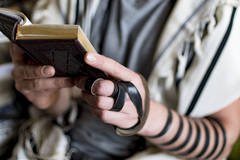The Shabbos Project comes to B'nai Avraham November 17-19
| Author | |
| Date Added |
A great opportunity to experience shabbos at our shul, with a community challah bake and special luncheon featuring speakers from our congregation discussing why and how shabbos is meaningful to them. Details to follow. For more information, email office@bnaiavraham.org.
"Israel–Culture and Conflict" lecture recording from October 23
| Author | |
| Date Added |
Our first lecture in this monthly series. Dr. Daniel Polisar is a Middle Eastern politics and Zionist history expert from Shalom College in Jerusalem.
This talk focuses on the global challenges that Israel faces from Iran and the withdrawal of the US from the middle east, along with the great opportunities ahead from the Abraham Accords and the growth of the "Start-up Nation."
President's message: Noach
| Author | |
| Date Added |
This week's Parsha, Noach, is bookended by two of the great stories of the Torah: the Flood, with the destruction of all of mankind save the family of Noach, and the Tower of Babel, which led to the disunity of mankind by separating the population by language.
While these events speak about global issues, I found a great insight in one of the smaller events described in the Parsha. We learn that after the flood, Noach became drunk and fell into a stupor, and lay naked He was discovered by his son, Ham, who goes to tell his brothers Shem and Yafet what he has seen. These two brothers return and clothe their father without looking at him. When Noah awakes, he blesses Shem and Yafet and curses Ham.
It’s easy to understand why Noach blessed Shem and Yafet, but why was Ham cursed? Were his actions really so bad? Rabbi Dovid Geeen explains that Ham’s sin was not shielding his father from shame. By speaking about it to his brothers, he further caused embarrassment. We learn that we must always try to overlook people’s faults, especially those close to us, in our family or in our community. We all have faults, but focusing on those of others, without trying to find the good, not only embarrasses them, but diminishes us. Full dvar text here.
• • •
This week kicked off our lecture series on Israel. We had Dr. Daniel Polisar speak live on Zoom both to an in-person audience in the shul, and many who watched remotely. The lecture and the Q&A sessions were incredibly stimulating and provocative. It was very gratifying to see how many people attended. The next lecture, with Michael Bassin, is scheduled for Nov 13. I look forward to seeing you all there.
Next week, we have a Shabbaton in Shul with Rabbi Shias Taub, who will be speaking both Friday night and on Shabbos. Information about the event and the registration form is here.
At this week's Board meeting we heard about a forthcoming upgrade campaign for the Mikvah. We will also be purchasing cabinetry to improve the Tallis bag and Siddur area, as well additional memorial plaques for the Shul.
As there is still much discussion about the orientation of the mechitzah, we will be sending out a questionnaire shortly about member opinions on the placement of the mechitzah, possible changes to its structure and possible changes to the placement of the Bimah and the Aron Kodesh. These will be tested out in the coming weeks and then reviewed by the Ritual committee and sent to the Board with a recommendation for a final decision.
The minutes from the last meeting were approved and will be sent to the membership, and I’ll discuss other topics that are still in process in next week's email. The date for the annual meeting will be announced soon, along with the Board slate for elections, per the bylaws. I’ve already been contacted by members who wish to be considered for the Board slate. I urge anyone else with interest to contact me or any Board member, so you can be considered. Instructions for those wishing to run will be sent out at the time that the annual meeting date is announced, no later that 45 days prior to the meeting.
Wishing you all a peaceful and meaningful Shabbat Shalom,
Steven Inker
President's Message: Ha'azinu
| Author | |
| Date Added |
Dear friends,
We are all familiar with the Song At The Sea that was sung after the exodus, but there is a second song in the Torah in this week's Parsha, Haazinu. This song is more somber, foretelling the trials and tribulations the Jewish people will go through and their deviations from the path of the Torah, but then their ultimate redemption.
In his commentary on the Parsha, Rabbi Berel Wein speaks about the title of the Parsha, Haazinu (“to listen"). He relates there is an echo from the giving of the Torah at Sinai that reverberates, and it is our job to listen for it. It is easy to ignore. It is that voice that tells us right from wrong, always there but often not paid attention to.
He also says the importance of listening goes further than hearing our own inner voices. It encompasses listening to what others say about us. Not only listening to criticism but internalizing constructive criticism to improve ourselves. This listening is much harder; it tells us the truths we don't want to hear.
Especially at this time of the year, it is important to work on ourselves by both listening to our internal conscience and by incorporating failings that others may point out to us. These failings are not absolutes, but genuine opportunities to improve ourselves.
As I’ve said here and in shul before, I welcome any comments, positive or negative, that I can learn from to hopefully improve myself. I have no doubt I'm not alone in this. I have to believe that the more open we are with each other, ultimately the closer we will become. (Full text from Rabbi Wein here.)
• • •
While I did miss davening in the tent for Yom Kippur, it was nostalgic to be back inside. (There will surely be discussions next year about the pros and cons of indoor vs. outdoor davening.) During the last-minute decision to move the minyanim indoors and setting up for services, we tried to keep the announcements and appeals to a minimum.
But I ask you now to please donate as you would have for Kol Nidre, for the upkeep of B'nai Avraham. The only true need for a Shul is a place to daven with a minyan, but we need your help to keep that place safe and dry and warm and comfortable. We need your contributions to do all of the things that accompany the davening and allow us to grow as Jews in brownstone Brooklyn: to learn Torah, to build a Jewish home and to experience the warmth of the Modern Orthodox and Chabad community that we have built here and makes us special. Click here to donate.
We now look forward to Sukkot, with our community dinner and the Sukkah Hop. Right after Sukkot, our monthly Israel lecture series kicks off on Sunday, Oct 23. Let’s all promote the positives and positions of Israel to the Brooklyn Heights community at large.
Wishing you all a peaceful and meaningful Shabbat Shalom, Shana Tova and Chag Sameach,
Steven Inker
President's Message: Vayelech
| Author | |
| Date Added |
Dear friends,
This week's Parsha, Vayelech, describes Moshe's final discussions with the Jewish People in a very curious way. The Torah relates that "He went" (Vayelech), but that he could no longer come and go. What was the point of the phrase "Moshe went?" Why is the Parsha actually called "He went?"
Rabbi Mordechai Kamenetzky, in his commentary on the Parsha, explains that even in his last hours, Moshe had the same vigor to prepare the Jewish people for their journey as when he led them out of Egypt. He went, until he stopped.
Our job in teaching and instructing doesn't end when we slow down. There is no concept of doing fewer mitzvot as we get older. We must continue to strive until we can no longer go. (Full text here.)
• • •
I've often noted that the Parsha always has a personal message for those who look for it. I've been talking to people about my term coming to an end, looking forward to more free time and fewer meetings (and fewer text messages!). The Parsha teaches me that the ninth inning is as important as the first.
To that point: Yom Kippur is next week and we will be trying out a different approach to selling aliyot. Men who have reserved a seat for the high Holidays should be receiving an email with a reservation form for aliyot for Yom Kippur. Please reserve the honors that you wish. All Honors that have not been reserved will be auctioned off on Yom Kippur. If you have any problems with the form, please let the Rabbi or any Board member or Officer know.
Right after the holidays, our monthly Israel lecture series begins.
After the Chaggim, the Board will review all of our recent planning and programs. Please let us know if you have ideas for a better system or experience. We are always interested in improving, and everyone's input helps.
Wishing you all a peaceful and meaningful Shabbat Shalom and a K'tivah V'Chatimah Tovah,
Steven Inker
Mon, April 28 2025
30 Nisan 5785
Today's Zmanim
| Alos Hashachar | 4:28am |
| Earliest Tallis | 5:05am |
| Netz (Sunrise) | 5:59am |
| Latest Shema | 9:26am |
| Zman Tefillah | 10:36am |
| Chatzos (Midday) | 12:54pm |
| Mincha Gedola | 1:28pm |
| Mincha Ketana | 4:56pm |
| Plag HaMincha | 6:22pm |
| Shkiah (Sunset) | 7:49pm |
| Tzais Hakochavim | 8:33pm |
| More >> | |
Follow Congregation B'nai Avraham's Social Media channels
 If you're on Social Media, follow our shul.
If you're on Social Media, follow our shul.
__________________________
•YouTube (Bnai Avraham)
__________________________
•WhatsApp Daily/Main Minyan
•WhatsApp Hasgacha Minyan
•WhatsApp General Chat
•WhatsApp Sisterhood
To join any of the above WhatsApp groups, write to request an invite: Shternieraskin@gmail.com
__________________________
•WhatsApp Daf Yomi
To join the Daf Yomi group, write to request an invite:
__________________________
Click here to read some of what the Rebbe said about the use of technology in spreading words of Torah.
Jewish News Links
These external news links provide general information and their listing here in no way implies an endorsement.
Brooklyn News Links
These external news links provide general information and their publication here in no way implies an endorsement.
Candlelighting Times
B'nai Avraham is your Brooklyn Heights shul
117 Remsen St
Between Clinton and Henry
streets in Brooklyn Heights
Shabbos

FRIDAY Mincha and Kabbalat Shabbat/Maariv): 4:12 pm
SATURDAY: Shacharit 8 am and 10 am
Mincha/Maariv: at candellighting time
From THIS WEEK'S ACTION newsletter: Kiddush this shabbat is sponsored by three parties: Jamie Betesh Carter in memory of her father, Shaul Betesh; Brooke and Alon in honor of Frida's birthday; and Steve Cohn in memory of his father. Thank you all!
Weekday Minyanim

.
.
To receive timely weekday minyan updates, please join the WhatsApp group. Write office@bnaiavraham.org to join.
SHACHARIS
Monday to Friday: 7:45 am
Sunday: 8:45 am
MINCHA/MAARIV:
Sun: at candle-ighting time
Monday thru Thursday: 8 pm
Let's Learn! Classes this week at CBA
Schedule subject to change
•Sunday 11:00 am
The David Berg Lecture Series
Perkei Avot study with Rabbi Aaron Raskin. In person and on Zoom.
Meeting ID 217 795 2137. Passcode 06355
•Monday 8:15 pm
Halacha with Rabbi Yankel Raskin (in person). Email heightsrabbi@gmail.com for more information.
•Monday 8:30 pm
Daf Yomi (on Google Meet)
For link write: Mark_Zelcer@gmail.com
•Tuesday 8:15 pm
Parsha with Rabbi Hubner, in person and click here for Zoom.
•Wednesday 9:15 am
Parsha class for women
with Rabbi Raskin.
In person or on Zoom:
Meeting ID 217 795 2137.
Passcode 06355
Thursday 9:30 am
Maamar: Chassidic DIscourses on the upcoming holidays
Meeting ID 217 795 2137.
Passcode 06355
Thursday 8:30 pm
Daf Yomi (see Monday)
•Saturday 9:30 pm
Daf Yomi (see Monday)
Join Our Mailing List
Stay in touch with the shul. Choose what communications you'd like to receive.




